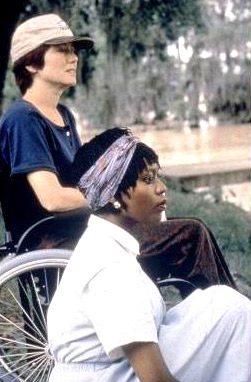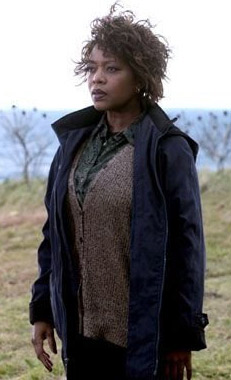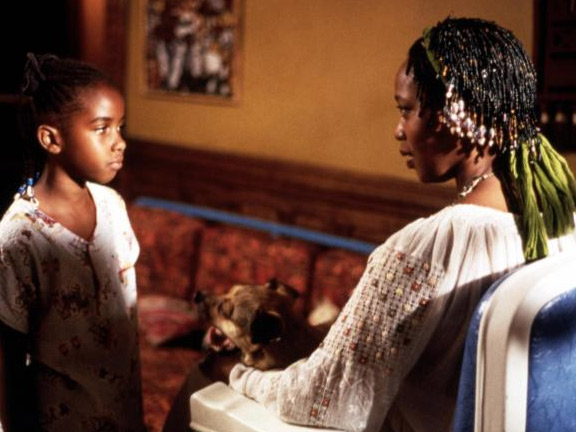 A great 1990s duet: PASSIONFISH with McDonnell & WoodardCraig here with Take Three. Today: Alfre Woodard
A great 1990s duet: PASSIONFISH with McDonnell & WoodardCraig here with Take Three. Today: Alfre Woodard
Take One: Passion Fish (1992)
After dismissing a string of unsuitable nurses, recently paralysed TV actress May-Alice (Mary McDonnell) opts to hire Alfre Woodard’s mysterious Chantelle in John Sayles’ Bayou drama Passion Fish. Chantelle enters the film out of nowhere, off a bus and into May-Alice’s house. She doesn’t let on any overt details about her life, but there’s a hint of intrigue about her, something amiss and troubling. It's evident in the slightly trembling nervous manner in which Chantelle goes about her new position. McDonnell’s icy actress will gradually thaw as a result of her dependency, but not before she attempts to make life miserable for Chantelle – who’s having none of it.
Chantelle is headstrong and defiant and she doesn’t suffer defeat readily. Woodard embodies these traits, but never adheres to over-familiar actorly tics in the way she conveys them. When wheeling May-Alice outside for exercise, Chantelle leaves her to fend for herself with a sarcastic motivational response.
Mary Alice: I want to go back inside!...It’s uphill!
Chantelle: So's life!"
Instead of merely showing us McDonnell’s abandoned reaction, Director John Sayles shows us Woodard's nurse pensively thinking in a swing chair. Chantelle is not the concrete-hard carer she likes to make everyone think she is. [more on Passionfish and two more takes after the jump]
Woodard treads this line so deftly, that she both makes us question Chantelle’s actions and understand her reasons for being so evasive. We do eventually discover the ghosts in her past, and this revelation late in the film offers further enticing angles to the character. The scenes where Woodard and McDonnell bond in awkward then winsome fashion make the film highly memorable. And although McDonnell nabbed a Best Actress Oscar nod for her performance, the Academy really – and I mean really – missed a trick by ignoring Woodard in the Supporting Actress category. She gives one of the best and most nuanced character performances of the 1990s.

Take Two: The Forgotten (2004)
The Forgotten isn’t a particularly good film by any stretch, but there are a few moments in it that I’ve been unable to dislodge from my brain. Woodard plays Detective Anne Pope, a woman who finds herself investigating Julianne Moore’s extraterrestrial shenanigans and disbelieving a lot of what she stumbles across. You can’t blame her, really, as a lot of silliness ensues which makes scant sense for an audience. Moore gives good frazzled panic while Linus Roache, Dominic West and Gary Sinese baffle us with random nuggets of dodgy exposition. Woodard pops up intermittently to add some characterful class to the proceedings. Pope is the audience’s surrogate and we “detect” alongside her all the plot’s otherworldly disturbances. Woodard's nice peripheral turn would be a thanklessly rote role if played by just any paycheck actress. But it’s one that Woodard, ever the sterling professional, gives her all to.
 So, when it comes to the bit where she’s required to actually make an impact on the plot, it's hard not to feel cheated. Pope has just witnessed for herself the alien-like terror that Moore’s been banging on about. Visibly shocked and agitated, she’s about to blurt out something interesting and cement her performance with what could be a definitive speech and – Yoink! – she’s tugged skyward by some unseen alien force, never to be seen or heard of again. It’s baffling, inexplicable and actually rather sad. It's also the most memorable bit thanks to the brief impact Woodard creates. Come back Anne Pope, you made The Forgotten worth watching for a brief time.
So, when it comes to the bit where she’s required to actually make an impact on the plot, it's hard not to feel cheated. Pope has just witnessed for herself the alien-like terror that Moore’s been banging on about. Visibly shocked and agitated, she’s about to blurt out something interesting and cement her performance with what could be a definitive speech and – Yoink! – she’s tugged skyward by some unseen alien force, never to be seen or heard of again. It’s baffling, inexplicable and actually rather sad. It's also the most memorable bit thanks to the brief impact Woodard creates. Come back Anne Pope, you made The Forgotten worth watching for a brief time.
Take Three: Crooklyn (1995)
Crooklyn is very much a family affair for Spike Lee. His 1994 coming-of-age comic-drama centres on the Carmichael clan over the summer of 1973 in the Bedford–Stuyvesant neighbourhood in Brooklyn. It was co-written with Spike’s siblings, Cinqué Lee and Joie Lee. Woodard plays the mother, Carolyn, who is always doting on or cooking for her five kids and husband Woody (Delroy Lindo). She gets many moments around the kitchen table to display maternal warmth or, failing that, wittily talking back to her unruly brood’s insouciant ways. As Lee flits between scenes of family (disharmony) and neighbourly intervention, Woodard gets only piecemeal time to establish her character but makes a strong impression all the same.
There’s a hint that something will go wrong, that Carolyn may well succumb to an unfortunate plot event, and – SPOILERS ABOUND! – two-thirds in that’s exactly what happens. Woodard avoids cliché in the hospital sick-bed scenes and delivers a broken direct-to-camera late emotional monologue to her daughter Troy – in the form of an imaginary letter from beyond the grave.

Though Woodard displays evidence enough of her individual power as a great screen actress in every scene, she really deserved a better Spike Lee joint. Had the film, say, been made up entirely of her fourth-wall-breaking audience addresses, this would’ve been a wondrously singular Alfre Woodard showcase. That's something that we all know the movies have sorely lacked.
Three more films for the taking: Cross Creek (1983), K-PAX (2001), The Family That Preys (2008)